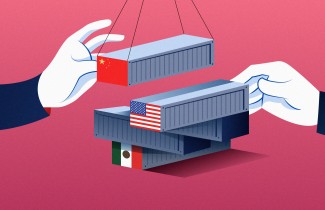Bad Times for Davos
An environment of turning away from globalization affects Mexico in several angles
In the years before the 2008 financial crisis, the Davos World Economic Forum would offer a stamp of concurrence among the planet’s political and economic élite.
This image is now far in the past after a decade in which populism and protectionism have become the platform for changing the globalization model. Over the past ten years, as the The Economist explains in its recent article “Slowbalisation”, globalization has slowed down: cross-border investment, international trade, bank loans and supply chains have gradually diminished or come to a halt.
In this context, Davos no longer appears to be a priority in leaders’ agendas. In 2019, we have witnessed the absence of Donald Trump, Xi Jinping and Vladimir Putin, among others, reducing the expectations of major announcements and of a broad forward-looking approach. A clear message that the world powers would prefer to be addressing their own internal affairs.
Nevertheless, global challenges remain unresolved, as reflected in the round tables at Davos: the future of manufacturing, consumption, progress, energy, urban mobility, the environment, entertainment and informatics, among others.
In the Chinese representatives’ presentations, China revealed a discourse that appears to favor globalization even more than the United States of America, auguring continued commercial tensions. In addition, data for foreign direct investment and merchandise exports and imports are showing weaknesses after a year-long “trade war”.
The British chancellor, Philip Hammond, sought to reassure and sway governments and large companies about the UK leaving the European Union (Brexit), but with exceptions, so that markets will not be abandoned. Whether or not he has achieved this is uncertain.
With all this, there is an environment of turning away from globalization, together with populism and little respect for the global trade system and its laws and regulations. This affects Mexico in several angles:
- As a representative of Latin American countries and emerging economies (foreign policy aspect)
- Reduction in the consolidation of productive chains and attractiveness of doing business with and in Mexico (economic and productivity aspect)
- Drop in foreign investment attraction, both direct, in sectors and production plants, and portfolios (country risk aspect)
Investment is the aggregate demand component that creates jobs. The prediction of a drop in or lack of dynamism in national and international public and private investment would prevent the potential annual growth of the Mexican economy from reaching 4-5%, as expected.
Furthermore, investors who met in Davos are concerned about the unrestrained growth of public debt in the world’s leading countries since the crisis of 2008. While European governments have accelerated their convergence to reduce public debt and deficits –Angela Merkel stressed that after 50 years, things are better than ever in the EU —, in Latin America it remains to be seen whether the commitment and political will of the new governments of the great regional powers, Brazil and Mexico, will translate into results.
Finally, if Davos wants to recover its centrality and popularity in the world, it needs to accentuate a major challenge that has nourished the boom in populism: social inequality. In Mexico, we should not wait for the world élite to meet, but fight against inequality with the tools we have within our reach: maintaining and relaunching education reform, and improving working conditions and social policy –which should not consist of handouts— in a commitment to society through a multiannual plan.



